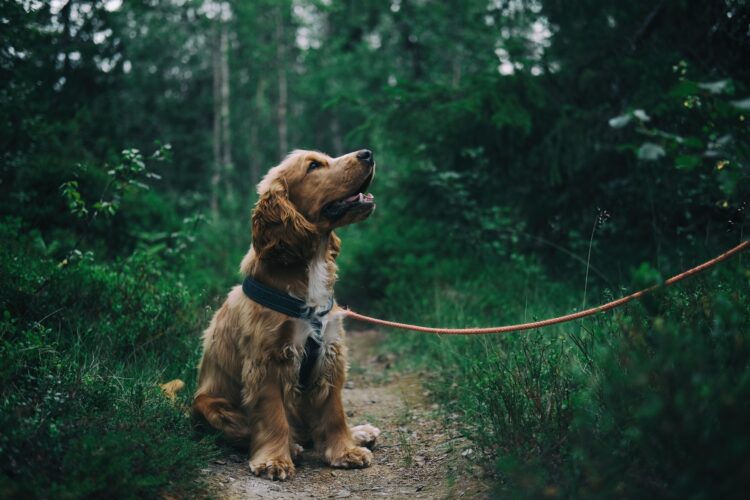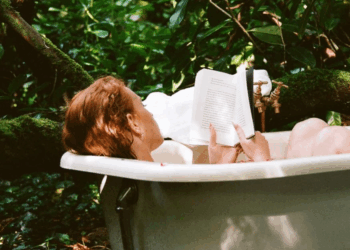Are you worried about how your dog is behaving right now, or how they’ll readjust to life at home alone when you go back to work? We asked an animal behaviourist for advice on keeping dogs happy and calm now, and during the transitional period ahead

Lockdown is challenging, but enjoying quality time with pets is a real upside. Having someone to play with all day, getting some extra cuddles and exploring the local area more on a daily walk might mean that your dog is having the time of its life. So how will they cope post-lockdown?
On the other hand, some dog owners may have noticed their dogs growing more irritable and grouchy during lockdown, which can be really worrying.
Animal behaviourist Nanci Creedon has received lots of queries from concerned pet owners who are starting to realise that lockdown will have lasting implications for their dogs.
“That initial sense of panic is over for us as humans, this lockdown situation is starting to feel normal, and it might be starting to occur to people, hang on, what’s next for our dogs,” Nanci says. “Once this all ends, and lockdown for us is over, that is when lockdown for our dogs begins.”
Dog lockdown
Nanci explains that for dogs who have been thriving during lockdown and enjoying all this quality time with their owners, readjusting to life at home alone again will be really confusing for them.
“When the restrictions eventually ease up for us, our dogs will be the ones who feel cooped up, as we go off to work and leave them for long periods of time. Separation anxiety and separation related behaviours are what we don’t want, so things like chewing and howling, and any upset your dog will go through,” Nanci says.
Zoom meetings and calls have been our lifelines during lockdown, and you can use the app to help your dog too. Nanci recommends using the app now to get an idea of how your dog will behave when you do eventually have to leave them on their own for a long time. Here’s how:
- Set up your laptop with the camera monitoring the room that your dog is going to be in when you do go back to work.
- Sign in to Zoom with a different account on your phone.
- Pretend to go to work as normal. Grab your suitcase or your handbag, whatever you normally take with you when you go out the door, and say goodbye to your dog as you normally would.
- Go out and sit in your car, out of sight of your dog. Do some work or read a book or whatever for a while, but from here you will want to watch on your phone what your dog is doing, so you can analyse their behaviours.
“What you will probably see with practically every dog anyway, is that for the first 15 or 20 minutes they are going to potter about, they’re going to be active, they’re going to look for you,” Nanci says. “What you are waiting to see is what they do after that 20 minutes. Do they start engaging in stress behaviours like scratching, barking and howling, pacing? Does that continue to escalate, or does the dog start to settle down?”
Hopefully, your dog will be able to settle themselves after that amount of time.
“If that doesn’t happen and the anxious behaviour starts to escalate, you do have a problem on your hands and will need to seek professional help. There is no one-size-fits-all solution. If your dog does calm down after the 20 minutes are up, then you don’t need to worry too much.”
Create calm during the crisis

What if lockdown with your pet hasn’t been the idyllic enjoyable scenario you keep seeing on Instagram? Don’t worry too much if your pet has been acting up since lockdown began, as there is a very good reason for that.
“Some dogs will find the current situation overwhelming, and are actually dying for the day that life goes back to normal,” Nanci explains. “The thing that we need to be considering, and the underlying cause of the emails about behaviour problems I am getting from dog owners at the moment, is that our dogs are exhausted.
“Our dogs are really meant to be sleeping for 16-18 hours a day, and now that we have kids home from school, they’re running around, making noise, and the general coming and going of family life, our dogs aren’t getting their deep sleep. Even in a household of adults, they are up and down every 15 minutes to make a cup of tea, make a phone call, answer the doorbell, so the dogs are not going to sleep.
“What you will see then is irritability, anxious behaviours where they seem to be confused, they don’t know what you want them to do. We are probably noticing a little bit of grumpiness towards kids too, where our dogs have just had enough of being poked and prodded and disturbed. They’re exhausted, so you’re going to start seeing some growling behaviour towards kids then.
“This isn’t something that the dog is doing wrong, this is about us as humans failing to understand our dog’s needs and to provide for those needs.”
So how can we help our dogs get the R&R they need when we are all at home? Nanci recommends setting up a spa zone for your dog to escape to throughout the day. It’s very easy, you will need:
- A designated quiet spot in the house where your dog won’t be disturbed and that they can easily access themselves. Try a utility room, conservatory or spare room that is clean and safe for them to be in alone
- An audiobook. Rather than relaxing music like Lyric Fm, the latest science shows that audiobooks are more relaxing for dogs. Have an audio book playing in the spa zone
- A very comfy bed for your dog, ideally with a cosy blanket they can snuggle into. Even a duvet folded in half will do.
- Something they can chew. Chewing releases the hormone dopamine which calms dogs down
- Try Pet Remedy, which is a plug-in with an essential oil to calm down dogs and cats
Send your dog to their spa zone for a few hours at a time throughout the day, so that they can rest undisturbed. They should get into the habit of going their themselves when they feel they need to. Remember if they are chewing, it is not that they are acting out or being a stereotypical puppy.
“When you see puppies chewing on the legs of your table or on your shoes, it is because they are anxious, and they are trying to get that hit of dopamine to calm them back down,” Nanci says.
Every dog can benefit from the spa zone technique. “Even if your dog is loving all the company at home, it is still important to set your dog up with their own relaxing space and give them alone time. It is good to keep them in the habit of not exactly self-soothing, but more enjoying their own company. If they have their own area with all they need to relax and be comfortable away from the family for a few hours, then you are less likely to have a problem on your hands when lockdown is over.”
New puppies
If you welcomed a puppy into your life during lockdown, you need to consider how they will cope in future.
“My whole industry is a bit panicked and nervous about what is going to happen to what we call ‘lockdown puppies’, because those puppies will think this is normal life. Right now they think that someone is always going to be there to hang out with them at home. The reality is really going to hit them with a bang when their owners get back to work,” Nanci says.
“If someone is after getting a new puppy lately, then that puppy is missing out on that critical socialisation period in that dog’s life. That doesn’t mean that they should panic, or respond by cramming in as much experiences as they can.
“What it does mean is that you need to be conscious that your dog hasn’t met a lot of new people and other dogs in this period of time. You need to watch your dog. Once the lockdown lifts and you can meet other people and dogs, you need to be very aware of your puppy’s behaviour and let the puppy choose. If you are having a garden party and having a couple of relatives over in the coming weeks, don’t force your puppy on people. Don’t hand your puppy to people.
“Always put the puppy on the ground and let the puppy choose to go to the people. Same with kids as well, let children know that that is the rule. Then when it is possible again, make sure you get to your puppy parties and puppy socialisation classes when you can again. You need to be careful, not all classes are run in the same way, you need to go to one run by the Association of Pet Dog Trainers. They will be qualified and know what they are doing, and so will keep your puppy is safe.”
Adopt after lockdown
If lockdown has made you realise you want to become a dog owner, contact your local rescue now. “There has been a rise in people fostering dogs, so they have taken in the dogs for this lockdown, but they will need to go back to work and not be able to hold on to the dog. These dogs will have adjusted to normal life with these families, so it is a really good time for a dog to move into their forever home. They are more likely to be toilet trained, calm and not chewing on things. But they would find it hard to go back to a rescue centre again. So reach out to the rescue centres now, get on a waiting list and that way you can ensure these dogs don’t have to go back into a rescue centre.”
Nanci Creedon is an animal behaviourist, and a tutor at Creedon’s College in Cork. You can contact Nanci here.
The May | June issue of Irish Country Magazine is in shops and available for digital download now. Take a look inside here.
Main photo by Johann from Pexels. Second picture by Christian Domingues from Pexels.








